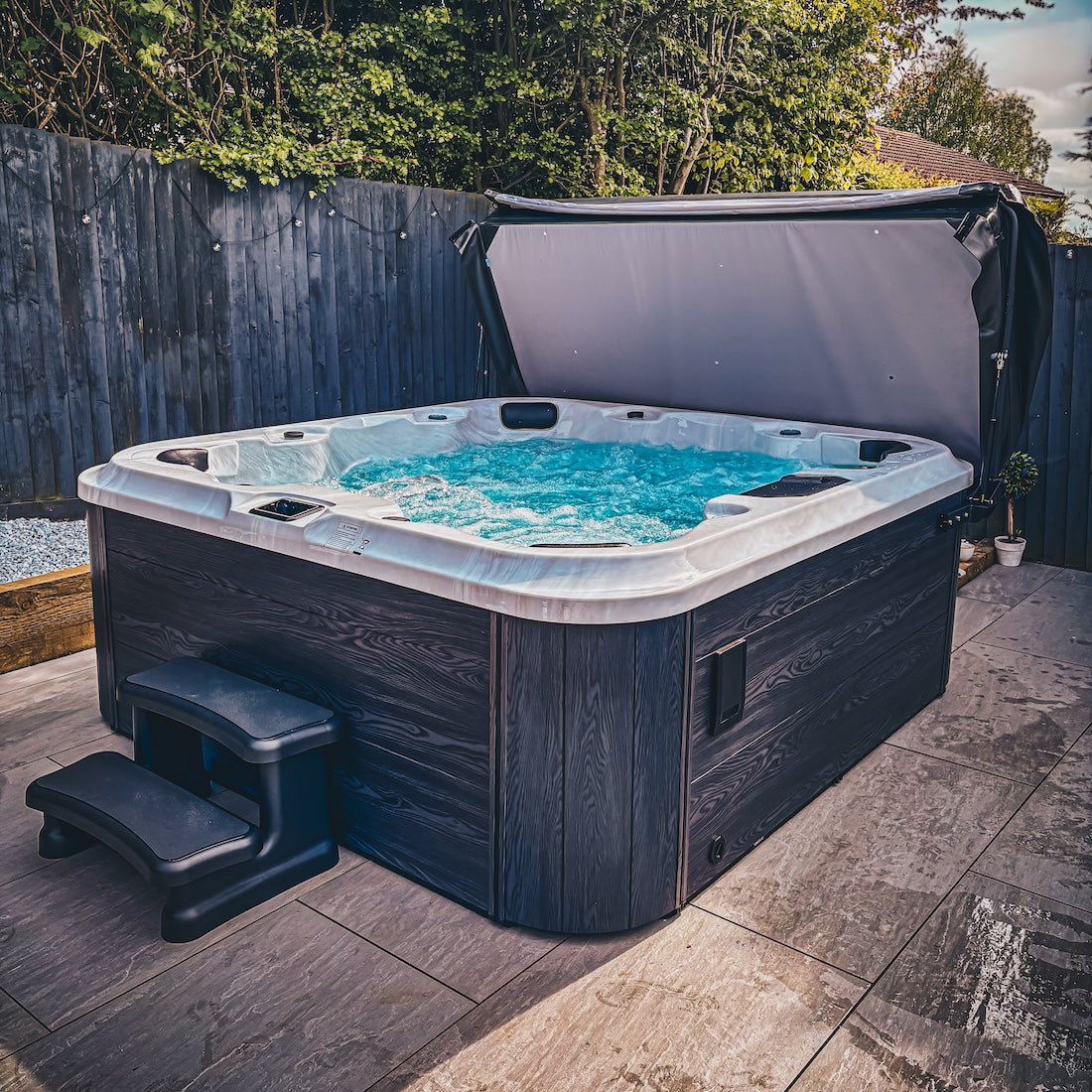Share
Let’s be honest: when we think about heart health, most of us picture running shoes, spinach smoothies, and that doctor’s advice we half-ignored about cutting back on bacon. Hot tubs? Not exactly top of the list. But here’s the thing we don’t talk about enough – the relationship between warm water and cardiovascular wellbeing is actually more meaningful than we might expect.
So, what if we told you that spending time in a hot tub could help support your heart? Not as a replacement for good nutrition or exercise, obviously – but as a surprisingly helpful addition to a heart-friendly lifestyle.
Let’s explore the lesser-known but evidence-backed ways hot tubs can quietly benefit our cardiovascular system.

Warming Up, Without the Workout
We all know exercise raises our heart rate and improves circulation. But so does a soak in a hot tub. In fact, studies have shown that immersing ourselves in warm water increases heart rate and dilates blood vessels – both of which improve blood flow and reduce strain on the heart. The difference? It happens passively.
A study published in the American Journal of Physiology found that immersion in hot water at 40°C increased heart rate by around 31 BPM and significantly improved vascular function.
We’re not saying hot tubs should replace walking or swimming, but they do offer a form of passive cardiovascular stimulation that mimics light aerobic activity. Perfect for rest days, recovery, or for those with mobility issues.
Lowering Blood Pressure – Yes, Really
One of the most documented effects of hot tub use is vasodilation – the widening of blood vessels. When our blood vessels open up, blood flows more freely, which naturally reduces blood pressure.
A 2016 study published in the Journal of Physiology found that passive heat therapy (using hot water immersion) reduced systolic blood pressure by 8 mm Hg and diastolic pressure by 5 mm Hg over an eight-week period.
A Japanese study on hot spring bathing also found regular soaks led to lower blood pressure and improved arterial health.
For people with hypertension or borderline high blood pressure, this is not insignificant. Obviously, we’d always say speak to a GP if you’ve got heart concerns, but regular soaks can become part of a broader blood pressure management plan.

Stress and the Heart: The Quiet Link
We tend to separate stress and heart health in our minds, but they’re closely tied. Chronic stress raises cortisol levels, which increases inflammation, blood pressure, and heart rate – all of which can take a toll on our cardiovascular system over time.
Now, let’s bring hot tubs back into the picture.
Warm water naturally calms the nervous system. It lowers cortisol, helps shift the body into a parasympathetic (rest and digest) state, and makes us feel safe and grounded. That emotional exhale we experience after a soak? It’s not just in our heads. It’s a literal signal to our body that it can let go of fight-or-flight mode.
So while the jets might feel like a luxury, they’re doing real work in the background to support cardiovascular balance.
Improved Circulation, Better Oxygen Delivery
Good circulation is essential for heart health. It ensures that oxygen and nutrients reach the organs and muscles efficiently, and helps the heart do its job with less effort.
Hot water immersion promotes blood flow to the extremities and increases plasma volume. What does that mean in plain English? Our blood is moving more freely, oxygen is getting delivered faster, and our heart isn’t having to fight against tight vessels or tension. It’s like giving our circulatory system a free-flowing motorway instead of stop-start city traffic.
A Gentle Boost for People with Limited Mobility
For people recovering from surgery, managing chronic fatigue, or living with physical disabilities, cardiovascular exercise can be challenging. Hot tubs offer a rare middle ground – a way to gently raise heart rate and improve circulation without demanding high levels of physical effort.
And because hot water reduces gravitational pressure on the body, joints and muscles relax, allowing for light stretching or movement in ways that would be uncomfortable on dry land. This can help build confidence and physical resilience over time.
Thermal Therapy and Heart Failure: A Word on Safety
Now, we’d be doing you a disservice if we didn’t bring a bit of balance.
If someone has advanced heart disease or has experienced heart failure, hot tub use should be approached with caution and only with medical clearance. The rise in heart rate and potential drop in blood pressure might be risky for some, especially if medications or fluid retention are involved.
But – and it’s an important but – some small-scale studies have shown that supervised warm water therapy can improve symptoms in heart failure patients when managed carefully.
So this isn’t a no-go zone. It’s just something that needs the right advice.
Hot Tubs and Heart Health: A Supporting Role
So, are hot tubs the secret to a healthier heart? Not quite. But they’re a surprisingly effective co-star in the bigger picture of cardiovascular wellbeing.
Used regularly, they can:
-
Gently stimulate heart rate
-
Improve circulation
-
Lower blood pressure
-
Reduce stress (and its harmful effects on the heart)
-
Support physical activity recovery
-
Aid those who can’t exercise easily
They’re not a silver bullet. But they are a warm, welcoming, and enjoyable way to care for one of the most important muscles in the body.
Conclusion: Why the Heart Loves a Good Soak
So next time someone raises an eyebrow and asks "Are hot tubs really good for you?" – we’ll have a better answer than just "They feel nice."
Because when it comes to the heart, hot tubs tick a surprising number of boxes. From better circulation and blood pressure control to stress relief and recovery, they quietly earn their place in the conversation about long-term heart health.
And if we can care for our cardiovascular system while sipping something cold, under the stars, with the gentle sound of jets bubbling away? Sounds like the sort of heart-friendly habit we could stick to.
Explore Our Range of Heart-Healthy Hot Tubs
If this has got you thinking differently about what a hot tub can do, why not take the next step? Browse our full range of hot tubs, designed for comfort, relaxation and everyday wellness.


